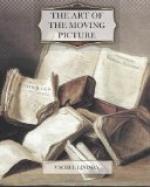Edgar Poe, always a magician, blends this power with the prophetical note in the poem, The Haunted Palace, and in the stories of William Wilson, The Black Cat and The Tell-tale Heart. This prophet-wizard side of a man otherwise a wizard only, has been well illustrated in The Avenging Conscience photoplay.
From Maeterlinck we have The Bluebird and many another dream. I devoutly hope I will never see in the films an attempt to paraphrase this master. But some disciple of his should conquer the photoplay medium, giving us great original works.
Yeats has bestowed upon us The Land of Heart’s Desire, The Secret Rose, and many another piece of imaginative glory. Let us hope that we may be spared any attempts to hastily paraphrase his wonders for the motion pictures. But the man that reads Yeats will be better prepared to do his own work in the films, or to greet the young new masters when they come.
Finally, Francis Thompson, in The Hound of Heaven, has written a song that the young wizard may lean upon forevermore for private guidance. It is composed of equal parts of wonder and conscience. With this poem in his heart, the roar of the elevated railroad will be no more in his ears, and he will dream of palaces of righteousness, and lead other men to dream of them till the houses of mammon fade away.
CHAPTER XXI
THE ACCEPTABLE YEAR OF THE LORD
Without airing my private theology I earnestly request the most sceptical reader of this book to assume that miracles in a Biblical sense have occurred. Let him take it for granted in the fashion of the strictly aesthetic commentator who writes in sympathy with a Fra Angelico painting, or as that great modernist, Paul Sabatier, does as he approaches the problems of faith in the life of St. Francis. Let him also assume, for the length of time that he is reading this chapter if no longer, that miracles, in a Biblical sense, as vivid and as real to the body of the Church, will again occur two thousand years in the future: events as wonderful as those others, twenty centuries back. Let us anticipate that many of these will be upon American soil. Particularly as sons and daughters of a new country it is a spiritual necessity for us to look forward to traditions, because we have so few from the past identified with the six feet of black earth beneath us.
The functions of the prophet whereby he definitely painted future sublimities have been too soon abolished in the minds of the wise. Mere forecasting is left to the weather bureau so far as a great section of the purely literary and cultured are concerned. The term prophet has survived in literature to be applied to men like Carlyle: fiery spiritual leaders who speak with little pretence of revealing to-morrow.




